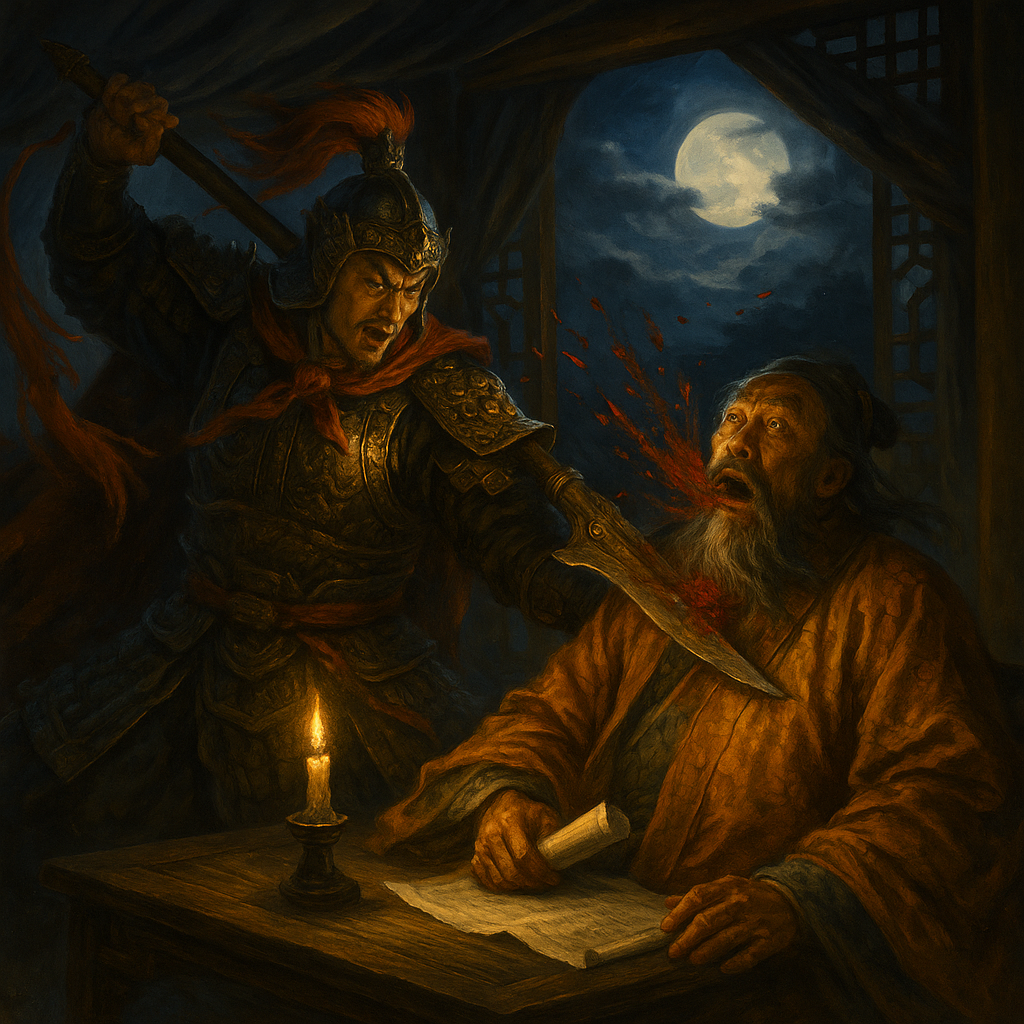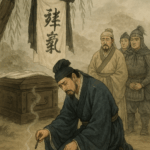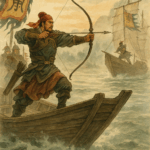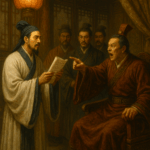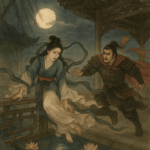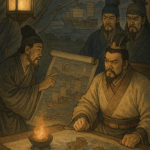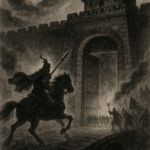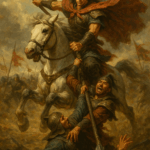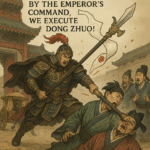That day, Cao Cao approached General‑in‑Chief He Jin and said, “The scourge of palace eunuchs has plagued every dynasty. Yet the sovereign should never have entrusted them with such power. If you wish to punish the guilty, one prison official is enough; there is no need to summon outside armies. Should you attempt to exterminate them all, the plot will be exposed—and they will surely prevail.” He Jin bristled, “So you, too, harbor private designs?” Cao Cao bowed and withdrew, remarking under his breath, “Chaos follows whenever I advance.” Nevertheless, He Jin secretly dispatched imperial edicts overnight to the regional commanders.
Meanwhile, former General, Marquis of Aoxiang, and Inspector of Xiliang, Dong Zhuo—despite having failed to distinguish himself against the Yellow Turbans—had bribed the Ten Attendant Eunuchs to escape censure. He then forged ties with court aristocrats, securing high office and command of two hundred thousand troops in the western provinces, all the while nursing ambitions of rebellion. When the edict arrived summoning him to the capital, he rejoiced. He raised his banner and troops at once, left his son‑in‑law Niu Fu the post of Protector of Shaanxi, and rode eastward toward Luoyang in the company of his generals Li Jue, Guo Si, Zhang Ji, and Fan Chou.
His adviser Li Ru counseled, “Though we act under imperial orders, the eunuchs will surely plot against us. Why not petition in writing—properly and openly—and claim the mandate of heaven?” Dong Zhuo seized upon the plan and submitted a memorial which read in part:
“I have seen that all rebellions arise because the Ten Attendant Eunuchs—Zhang Rang and his fellows—insult the will of heaven. It is far better to cut off the roots of a fire than merely to douse its flames; to lance a boil is painful yet spares the body from deadly poisoning. I dare beat drum and sound horn in Luoyang, beseeching Your Majesty to execute these traitors. May Heaven and Earth bless this cause!”
He Jin, upon receiving the memorial, presented it to his court. The tribunal crier Zheng Tai objected, “Dong Zhuo is a ravening wolf; if he enters the palace gates, he will devour us all.” He Jin retorted, “You doubt everything and are unfit to plan any great enterprise.” Lu Zhi also warned, “I have long known Dong Zhuo’s outward charm masks a heart of steel. If he enters the imperial precinct, disaster will follow. Better to bar his way.” But He Jin would not relent; Zheng Tai and Lu Zhi both resigned in protest, and most ministers followed their example. He Jin sent to welcome Dong Zhuo at Mianchi, but the general halted his army at the city’s edge.
The eunuchs, realizing He Jin’s scheme, feared for their lives. Zhang Rang and his allies secretly stationed fifty executioners inside the palace’s Changle Gate, then warned Empress Dowager He: “General‑in‑Chief He Jin has forged an imperial edict to summon foreign troops to the capital to slaughter us. We beg Your Majesty’s pity and protection!” The Dowager replied, “Have the general come to court and explain himself.” Zhang Rang protested, “If we appear at his mansion, we will be cut to pieces! Better he come to the palace—or we shall only die before Your Majesty’s throne.” The Dowager issued her own decree commanding He Jin to enter at once.
He Jin prepared to obey, but Chief Clerk Chen Lin cautioned, “This edict is the eunuchs’ trick. You must not go—it will spell disaster.” He Jin scoffed, “An edict from the Dowager—what ill can come?” Yuan Shao warned, “The plot is out. Should you still enter, you risk ambush.” Cao Cao added, “First summon the eunuchs to answer for their crimes, then enter.” He Jin laughed them off: “I hold the reins of power—what can those eunuchs do?” In the end, Yuan Shao and Cao Cao each gathered five hundred of their finest soldiers (Yuan Shao’s under his younger brother Yuan Shu), and they escorted He Jin to Changle Gate. The eunuchs proclaimed, “By order of the Dowager, only the General‑in‑Chief may enter.” Thus Yuan Shao and Cao Cao stood guard outside the palace gates.
Undeterred, He Jin strode into the palace. At the threshold of the Jiade Hall, Zhang Rang and Duan Gui leapt out with their retainers and ringed He Jin in. He Jin cried for a way out, but every gate had been barred. With sword in hand, the eunuchs fell upon him, cleaving their former benefactor in two. A later poet lamented:
The Han court teetered on its final days,
Yet He Jin, heedless, took his seat of power.
Time and again he spurned his loyal friends—
Within the palace he received the sword.
Outside, Yuan Shao, seeing the General long delayed, called out, “Marshal, we await your return!” The eunuchs flung He Jin’s severed head over the wall and proclaimed, “He Jin plotted rebellion—his execution is complete. All his followers are pardoned.” Yuan Shao shouted, “The eunuchs have assassinated their lord! All true men to arms!” Under Wu Kuang’s command, they set fire to the gates. Yuan Shu’s men stormed the courtyard, slaughtering eunuchs of every rank. Yuan Shao and Cao Cao burst into the inner palace. There the eunuchs Zhao Zhong, Cheng Kuang, Xia Yun, and Guo Sheng were cornered at the Cuihua Tower and butchered with no mercy. The palace erupted in flames. Zhang Rang, Duan Gui, Cao Jie, and Hou Lan seized the Dowager, Crown Prince Xun, and Prince Chen of Chenliu, and fled north through the back corridors toward the Northern Palace.
Inside, Lu Zhi—who had not yet resigned—rushed to don armor and rush to the palace gate. He saw Duan Gui force the Dowager before him; brandishing his spear, Lu Zhi cried, “Duan Gui the traitor, how dare you seize the Dowager?” Duan Gui wheeled and fled. The Dowager leapt from a window and, protected by Lu Zhi, escaped harm. Wu Kuang pressed deeper into the court and found He Miao, He Jin’s brother, drawing his sword. Wu Kuang thundered, “He Miao conspired to kill his own brother—slay him!” The soldiers cried, “Let us purge these rebels!” Surrounded, He Miao was likewise cut down. Yuan Shao then ordered his men to sack the eunuchs’ families, killing women and children without distinction. Meanwhile, Cao Cao helped extinguish the flames, urged the Dowager to assume regency, and sent troops in pursuit of Zhang Rang and Duan Gui—seeking the young emperor.
Zhang Rang and Duan Gui fled northward with the Dowager and princes, braving smoke and fire all night until they reached the Northern Mangshan hills. Around the second watch, Min Gong—a low‑ranking clerk of Henan—summoned his militia, screaming, “Traitors, stand and fight!” Zhang Rang, seeing his peril, leaped into the river and drowned. The Dowager and princes, bewildered, hid among the riverbank’s tangled reeds as troops searched in vain. They huddled until dawn, chilled by dew and hungry, afraid to cry aloud. Prince Chen of Chenliu urged, “We cannot linger—let us seek safety elsewhere.” Clasping their robes together, they clambered up the bank into the bramble. In the gloom, they lost their way—until thousands of fireflies swarmed before them, lighting a path. “[These lights] must be Heaven’s aid,” said Prince Chen, and they followed the glowing insects until they came upon a humble farmhouse at the fifth watch.
That night its master dreamed two red suns had fallen behind his barn. Awakening, he donned his robe and stepped outside, lantern in hand. From afar he saw a crimson glow among the brush and hurried toward it—only to find two young men asleep in the grass: one of fair countenance, the other weaker and gaunt. The farmer asked, “Who are you, children, and how came you here?” The emperor did not reply. Prince Chen pointed to his brother: “He is the Emperor, driven into exile by the Ten Eunuchs. I am his younger brother, the Prince of Chenliu.” Overcome, the farmer—Cui Yi, younger brother of former Minister Cui Lie—knelt thrice and said, “I, too, fled the eunuchs’ corruption. I will protect Your Majesties.” He led them into his home, served them wine and food, and watched over them.
Meanwhile, Min Gong pressed onward and caught Duan Gui. “Where is the Emperor?” he demanded. Duan Gui lied, “We lost him on the road.” Enraged, Min Gong executed Duan Gui and displayed his head. Then he scoured the countryside until he came upon Cui Yi’s farmhouse. There, recognizing the young emperor, he knelt and entreated forgiveness. Together they mounted the sole spare horse; Cui Yi and Prince Chen shared another. They had not gone three li when a troop bearing imperial colors and drums thundered over the horizon—led by the newly empowered Tutor Wang Yun, Commander‑in‑Chief Yang Biao, Colonel Chun Yu Qiong, Colonel Zhao Meng, Commander Bao Xin, and most notably Colonel Yuan Shao, all escorting the emperor home. At the head of the procession, Cui Yi carried Duan Gui’s head to the capital’s gates as proof, and the emperor was welcomed back amid tears and rejoicing. A popular rhyme foretold:
“The Emperor is no Emperor, the Prince is no Prince—
Ten thousand riders storm northward on Mangshan’s wind.”
Yet before their carriage had gone but a few li, another host swept in: banners blotting out the sun and dust choking the air. The court fell silent; the emperor trembled. Yuan Shao dashed forth, shouting, “Who approaches?” From the swirl emerged a single warrior, who demanded, “Where is the Son of Heaven?” Shaking, the emperor could not speak. Prince Chen drew rein: “Who are you?” The stranger dismounted and saluted: “I am Dong Zhuo, Inspector of Xiliang, come to escort Your Majesty.” Prince Chen nevertheless scolded him: “If you come to protect the Emperor, why did you ride at such speed?” Dong Zhuo declared, “To save His Majesty from further danger.” Prince Chen then guided him to the emperor and treated him with courtesy; Dong Zhuo’s ambition to depose the emperor was kindled in his heart. That day they returned to the palace, mourning together—but the imperial jade seal was missing.
Dong Zhuo encamped his cavalry outside the city and daily rode into the capital in full armor, trampling the streets in fearsome display. None dared curb his arrogance. Retiring‑Army Colonel Bao Xin warned Yuan Shao, “Dong Zhuo’s heart is set on treason—he must be eliminated at once.” But Yuan Shao, mindful of the fragile peace, demurred: “The court has only just settled—better to bide our time.” Bao Xin took his own troops and fled to Mount Taishan, seeking sanctuary.
Meanwhile, Dong Zhuo won over the soldiers formerly loyal to He Jin, bringing them under his own banner. He confided to Li Ru, “I wish to depose the Emperor and enthrone Prince Chen of Chenliu—what say you?” Li Ru answered, “The court has no firm master. If you will not seize this moment, the chance will slip away. Tomorrow, host a banquet in Wenming Garden and summon all ministers there: address the question of deposition openly and behead any who dissent. That will establish your authority.” Delighted, Dong Zhuo summoned the ministers to the garden. Fearing Dong Zhuo’s power, none dared refuse. On the appointed day he dismounted at the garden gate, donned his sword, and took his seat. After a few toasts, he silenced the music and spoke with a roar: “The Son of Heaven is the lord of myriads. Should he lack the dignity to worship Heaven and Earth, how can he maintain our ancestral altars? The current Emperor is weak. Prince Chen of Chenliu is learned and wise—he should occupy the throne. I propose we remove the present sovereign and enthrone Prince Chen. What say you, ministers?” Not one voice dared reply.
Finally, Inspector Ding Yuan leapt forward, slamming his hand upon the table: “Unthinkable! Who are you to utter such treason? The Emperor is the true heir of his father, faultless in every way—why dare you plot his removal?” Dong Zhuo’s face darkened: “Obey me, or die!” He drew his sword to strike. In that moment Li Ru spied a lone figure behind Ding Yuan—a tall warrior in gleaming armor brandishing a curved halberd and glaring at Dong Zhuo. Li Ru hastily interposed, “This is a banquet of merriment, not of statecraft. Tomorrow, let us debate these matters in court.” The ministers urged Ding Yuan to mount and withdraw.
Dong Zhuo then addressed the assembly, “What think you of my proposal?” Lu Zhi replied, “My lord errs. In ancient times the virtuous Yi Yin was banished to Tonggong, and only after his exile did King Tai Jia repent. Then, Changyi Wang reigned but twenty‑seven days and slew over three thousand, so Huo Guang petitioned to remove him. A sovereign must never be discarded lightly. The present Emperor, though young, is 明仁慈—wise, benevolent, and blameless. You, a mere provincial inspector who never served the court, lack Yi Yin’s or Huo Guang’s virtue. To depose an heir is but the mark of a usurper, not a statesman.”
Fury flared in Dong Zhuo’s eyes. He drew his sword and lunged at Lu Zhi. But court attendants Cai Yong and Peng Bo interposed, “Lu Secretary is revered throughout the realm—if slain, the empire will tremble.” Dong Zhuo grudgingly sheathed his blade. Tutor Wang Yun then counseled, “Let us not decide the throne over wine—resume formal debate in court tomorrow.” The ministers quickly dispersed.
Dong Zhuo remained, sword in hand, before the garden gate. Suddenly, a rider dashed in circles outside, halberd raised. Dong Zhuo turned to Li Ru: “Who is that?” Li Ru answered, “He is Lü Bu, adopted son of Ding Yuan—an unparalleled warrior. Best to avoid him.” Dong Zhuo slipped back into the garden shadows. At dawn, Ding Yuan led his troops to the city gates. Enraged, Dong Zhuo and Li Ru rode forth to meet them.
On the field Lü Bu stood, hair bound high, clad in a hundred‑blossom battle robe and plated armor, girded with a jeweled belt, halberd at the ready. He called out, “Our land lies ravaged by eunuch corruption; you, who boast no merit, dare plot imperial deposition!” Dong Zhuo tried to reply—but Lü Bu spurred his horse in and struck with his halberd. Dong Zhuo’s lines broke; he fled thirty li to regroup. In camp he mourned: “That Lü Bu is no ordinary man. Should I win his loyalty, no one could challenge me.”
At once Li Ru volunteered: “Lord, trust me. Lü Bu and I hail from the same region. He fights with unmatched valor yet lacks counsel. Bring him under your banner, and you will rule the realm.” Dong Zhuo was pleased and asked, “How shall we persuade him?” Li Ru replied, “I have devised the words. Give me the famed steed ‘Red Hare’—the thousand‑li horse—and pearls and gold as offerings; I will win his heart.” Dong Zhuo exclaimed, “To rule the empire, how can I spare a horse?” Li Ru retorted, “If you would command the world, would you hesitate over one mare?” Dong Zhuo handed over Red Hare along with a thousand taels of gold, dozens of pearls, and a jade belt.
That night Li Su (Li Ru’s colleague) rode to Ding Yuan’s camp bearing these gifts. Lü Bu’s guards admitted him, and Li Su greeted Lü Bu: “Brother, how have you fared?” Lü Bu bowed: “Long have I waited. Where have you been?” Li Su said, “I serve as Colonel of the Tiger Guards. I rejoiced to hear of your virtue and belligerence. I bring you a horse that runs a thousand li a day—Red Hare—to aid your valor.” At Li Su’s command, the steed was led forth: a coat of burning ember, sinew like coiled springs, two zhang from muzzle to tail, and eight feet tall at the shoulder—its neigh shook the heavens. A later poem extolled Red Hare:
“A thousand leagues it sweeps the plains, uprooting dust,
Over streams and mountains, purple mists arise.
Its bridle snaps as it rears, jade reins trembling—
A dragon of flame from the Ninth Heaven descends.”
Lü Bu’s eyes gleamed. He embraced Li Su: “What gift can repay such grace?” Li Su replied, “I ask nothing; this is brotherhood.” Lü Bu ordered a feast. Over cups of wine, Li Su steered the talk back to Ding Yuan. Lü Bu protested, “It was only desperation that drove me from Ding Yuan’s side.” Li Su laughed, “A true hero seeks a worthy master. You, a warrior without peer, deserve one who can wield both sword and scepter. Ding Yuan lacked that talent. You should serve Dong Zhuo, who rewards merit and rules with clarity.” Lü Bu sighed, “I long for such a lord.” Li Su laid out the pearls, belt, and bridle: “These come with Dong Zhuo’s highest regard. To honor him is to secure your place at the world’s helm.”
Deeply moved, Lü Bu vowed, “Tomorrow I will slay Ding Yuan and ride to Dong Zhuo’s banner.” Li Su agreed, and they parted.
At the second watch, Lü Bu bore down on Ding Yuan’s pavilion with drawn blade. Ding Yuan sat reading by candlelight until Lü Bu burst in. “What brings you here, foster son?” Ding Yuan asked. Lü Bu snarled, “A true man does not serve a selfish master!” With a single blow he severed Ding Yuan’s head, then proclaimed, “Ding Yuan’s cruelty ends here—follow me or be gone!” Half the troops deserted on the spot. The next morning Lü Bu carried Ding Yuan’s head to Li Su, who escorted him to Dong Zhuo’s camp. There Dong Zhuo greeted Lü Bu with tears of joy: “Since I joined your banner, fortune had been barren—now you are my savior.” Lü Bu dismounted in homage: “Without your grace, I would be lost.” Dong Zhuo clothed him in gilded armor and silk and proclaimed him “Foster Son,” awarding him the titles Cavalry Colonel, Commandant, and Marquis of the Pavilion.
Li Ru urged Dong Zhuo to press on the question of deposition. The next day, Dong Zhuo hosted court ministers in the provincial administration building, deploying a thousand guards under Lü Bu’s command. Among the attendees was Grand Tutor Yuan Kui. After several toasts, Dong Zhuo rested his hand on his sword and proclaimed, “Our sovereign is too weak to uphold Heaven’s altars. We shall follow the examples of Yi Yin and Huo Guang: depose the boy emperor, enfeoff him as King of Hongnong, and set Prince Chen upon the throne. Any who object will die!” The ministers cowered in silence—until Colonel Yuan Shao leapt to his feet, sword drawn, and cried, “The Emperor has reigned but briefly and has known no fault. To depose the heir for the sake of your ambition is treason! Are you not a usurper?” Dong Zhuo sneered, “I hold the realm in my hand—who dares resist? Look upon my blade—does it not gleam?” Yuan Shao brandished his own sword: “Your blade is sharp, but mine has not failed!” The two warriors squared off amid the throng.
Thus ends the third chapter’s account—leaving the fate of Yuan Shao and Dong Zhuo’s designs to unfold in the chapters ahead.
